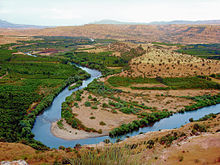Kurdistan Region
This is the sighted version that was marked on May 23, 2021. There are 2 pending changes that still need to be sighted.
Template:Infobox State/Maintenance/NAME-German
3645Coordinates: 36° 0′ N, 45° 0′ E The Kurdistan Autonomous Region (Kurdish ههرێمی کوردستان Herêma Kurdistan, Arabic إقليم كردستان Iqlīm Kurdistān, Kurdistan for short) is an autonomous region of Iraq. The region has an independent parliament based in Erbil (Hewlêr) and maintains its own military units, the Peshmerga.
In 1970, the Kurdish population in northern Iraq was legally granted partial autonomy for the first time by the central government in an agreement. However, the desired Kurdish partial autonomy was initially unable to establish itself during this period, which was marked by numerous ethno-political conflicts. The formation of a regional parliament in 1992 after the establishment of the no-fly zone over northern Iraq led to the de facto autonomy of the region. After the Iraq war, the region was recognized by special law. The Iraqi constitution, adopted in 2005, legally created the "region" as a territorial entity and consolidated the autonomy rights of the Kurdistan Region, which had been achieved until then, in this territorial entity. At present, however, the Kurdistan Region is the only region of Iraq defined as federal.
The official territory of the Kurdistan Region is composed of the Iraqi governorates of Dahuk, Erbil, as-Sulaimaniyya and Halabja. In addition, parts of the adjacent governorates are claimed, some of which are also de facto controlled by the Kurdish Regional Government.
Name
The name of the region according to the Iraqi constitution is Kurdistan Region (Arabic إقليم كردستان, DMG Iqlīm Kurdistān). In Kurdish ههرێمی کوردستان Herêma Kurdistanê. In the German-speaking world, the regional administration appears as the Kurdistan-Iraq Region, thus following the linguistic usage of the Foreign Office and the Austrian Federal Ministry for Europe, Integration and Foreign Affairs. In the mass media, however, the terms Iraqi-Kurdistan and Northern Iraq are widely used.
The Kurdish regional administration or government itself, which is also used as a synonym for the region, is called in Kurdish حكومهتى ههرێمى كوردستان Hikûmeta Herêma Kurdistanê, or in English Kurdistan Regional Government (KRG).
Kurdish activists also used the term Southern Kurdistan (Kurdish باشووری کوردستان Başûrê Kurdistanê) for all Kurdish-populated areas in Iraq beyond the region's borders.
Geography
Location
The territory of the Autonomous Region of Kurdistan is located in the north of Iraq and consists of the governorates of Sulaymaniyah, Erbil, Dahuk and Halabja. It borders three states: Syria to the west, Turkey to the north, and Iran to the east. The northernmost city in the region is Zaxo, the easternmost is Halabja, and the westernmost is Dohuk.
Landscape
The landscape in Kurdistan is largely mountainous. In the northeast is the Zāgros Mountains with the Cheekha Dar (3,611 m), the highest mountain in Iraq. Rivers flow mostly from north to south and partly from east to west. The most important rivers are the Great Zab and the Little Zab. The Great Zab rises in southeastern Turkey, the Little Zab in northwestern Iran. Both rivers flow into the Tigris.
Near the city of Ranya is the Dukan Dam with the associated Dukan Lake, the largest lake in the autonomous region of Kurdistan.
Climate
Kurdistan has a semi-arid climate.
March has average temperatures between 13 °C and 18 °C.
Summers are hot and without rain. In the following months, the temperature values increase drastically and in the months of June to September, the temperatures reach their maximum with an average of 39 °C to 44 °C, with values of almost 50 °C being reached on isolated days.
Autumn has temperatures comparable to those of spring, averaging 24 °C to 29 °C. However, it is marked by heavy rainfall, which also explains the average annual value of 375-724 mm.
Winters are generally mild, with temperature lows of 2 °C to 7 °C and temperature highs of 7 °C to 13 °C. In the mountainous regions with their rivers and rich vegetation, the climate is cool and rainy.

The Great Zab in Erbil Governorate
.jpg)
Lake Dukan near the city of Sulaymaniyah
Search within the encyclopedia